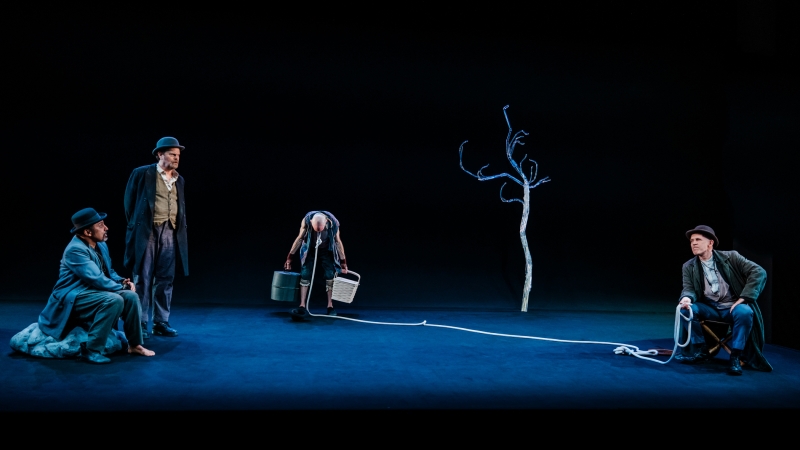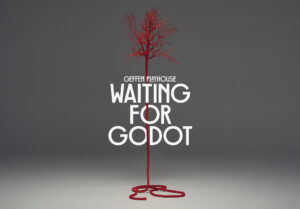
At the Geffen Playhouse, a timely production of Samuel Beckett’s masterwork demonstrates the profound significance of Estragon and Vladimir’s struggles for meaning in the 21st Century.
By John Lavitt
Los Angeles, CA (The Hollywood Times) 11-15-2024
“In the landscape of extinction, precision is next to godliness.”
— Samuel Beckett
When the Geffen Playhouse decided to schedule Samuel Beckett’s Waiting for Godot for mid-November of this year, they displayed a prescience that is downright impressive. Given the fractured state of American society after the recent election cycle, Beckett’s metaphorical take on the struggle to find meaning and order after the macrocosmic trauma of the Second World War feels like a harrowingly perfect fit for today’s world.
Indeed, like Vladimir and Estragon, we live in a landscape of extinction, and there are no easy answers beyond waiting to see how it will all play out in the end.
Produced in association with Gare St Lazare Ireland, Irish director Judy Hegarty Lovett delivers a powerfully authentic adaptation of the classic play. Kaye Voyce’s scenic and costume design resembled the iconic book cover of the play I read in high school. Although some subtle flourishes enhanced the stage, like a crystalline version of the famished tree, the overall presentation’s faithfulness underscored the work’s enduring value.
Indeed, such a take is wonderfully trusting of a modern audience’s ability to make the necessary connections to the world of the present day. Nothing is gained by tinkering with such a stroke of genius. Lovett’s confidence as a director allows the actors to bring out the best in Beckett’s play. On stage through the middle of December, Waiting for Godot at the Geffen Playhouse should not be missed.
In a performance that feels like a broken-down version of his character from The Office after the apocalypse, Rainn Wilson gives weight to Vladimir, bringing forth the character’s restless desperation to solve the impossible. Vladimir cannot keep still because he feels so helpless in the tragic face of society’s disintegration. He is the fractured soul at the core of the play. Wilson delivers a restrained performance of tortured significance by pulling back at just the right moments.
As his beleaguered friend and partner, Aasif Mandvi develops Estragon as a deeply sympathetic and charmingly amusing character who represents the persistent suffering of humanity. Unlike the intuitive metaphors of Vladimir, who cannot forget the past or ignore the future, Estragon lives exclusively in the present of bodily needs and feelings.
Losing connection even to the previous day, Estragon is victimized by the pain he suffers in a fallen world. Still, despite his suffering, he achieves moments of humor as Mandvi finds the lovable heart of the character.
Estragon and Vladimir play an endless game of existential ping-pong as they wait for Godot. They bounce between the reality of being forsaken and a dream of redemption. Their struggles reflect today’s divisions, as the United States is plagued by “fake news” and disinformation.
Like the two lost souls, many people desperately try to understand the truth behind the smokescreens and posturing dominating the news cycle. Indeed, we, too, feel displaced, as though we are waiting in perpetuity for the world to make sense again.

Beyond Vladimir and Estragon, the plight of Pozzo (Conor Lovett) and Lucky (Adam Stein) takes the audience’s understanding of the fallen world to another level. As a director, Lovett intriguingly casts two actors who look remarkably alike in these roles. Such casting underscores that class differences have nothing to do with physical reality beyond the fact that the upper classes eat better and receive better healthcare.
Although similar in stature, the two actors represent two extremes of society’s gap in welfare. The two actors do a fantastic job through their physical and verbal presence of bringing forth the essence of their roles.
While Pozzo represents the violent dismay of the upper classes in the face of society’s disintegration, Lucky is a more profoundly tragic figure. He stands for the failure of artists and writers to process and rationalize the immense scale of the ruins. Lucky has no value beyond his servitude. Everything he once valued now means nothing in a broken world.
Taking advantage of this hopelessness, Pozzo turns his servitude into an abusive domination that resembles slavery. However, Lucky’s dehumanization is a choice in the face of cataclysmic failure.

Although we are not living today in the shadows of concentration camps, there is a sense of hopelessness masked by endless diversions and reels. Like the characters in Waiting for Godot, we, too, are waiting for a savior to round the next bend at the end of the road. Unfortunately, the only savior we will likely find is the one looking back at us in the morning mirror.
In Waiting for Godot, Beckett knew that accepting such a responsibility is one of the most challenging choices a human can make and endure.